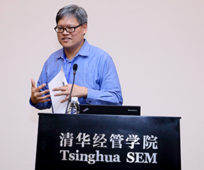
Hong Kong has been taken over silently by mainland China in financial terms already before the handover by the UK in 1997, says financial analyst Victor Shih to AFP. But what has gone wrong is the lack of tools to control that take-over, especially when Xi Jinping defined corruption as the major evil to be addressed, Shih says.
AFP:
Some analysts say the shopping spree in Hong Kong is also part of Beijing’s strategy to tighten its grip on the territory.
State-owned enterprises began to buy up properties to boost their businesses in Hong Kong in the 1980s, ahead of the 1997 handover from Britain, says Victor Shih, associate professor of political science at the University of California, San Diego.
“It’s to integrate the economies of Hong Kong and that of China, to make the whole process of reunification smoother,” he argues…
Corporate filings reveal a Chinese Communist Party organisation is at the top of the ownership chain of The Center.
A statement from Li’s CK Asset Holdings named the buyer as C.H.M.T. Peaceful Development Asia Property Limited, incorporated under the British Virgin Islands and set up as a “special purpose vehicle” specifically for the acquisition.
Its largest shareholder is Beijing-based China Energy Reserve and Chemicals Group, according to the South China Morning Post and Wall Street Journal.
The energy behemoth links back to the party — one of its four major shareholders, China Hualian International Trade Company, is owned by the China Economic Cooperation Center, corporate filings show.
The entity, according to various Chinese government sites, is controlled by the International Liaison Department, a Communist Party arm known for handling its foreign affairs.
Shih said such big deals could challenge the party’s internal governance at a time when President Xi Jinping is warning against corruption and profligate spending.
He points out The Center will generate millions of dollars of rent each year.
“The challenge for (the party) is whether they have the personnel and the framework to audit and monitor what must be enormous cash flows going through them,” says Shih.
Numerous mainland officials, their family members and businesses have set up shell companies in Hong Kong to siphon wealth to an off-shore location to diversify their risks, Shih added, creating a mutual dependency between the two economies.
“Hong Kong remains one of the biggest loopholes in China’s capital control,” he said.
Victor Shih is a speaker at the China Speakers Bureau. Do you need him at your meeting or conference? Do get in touch or fill in our speakers’ request form.
Are you looking for more strategic experts at the China Speakers Bureau? Do check out this list.





